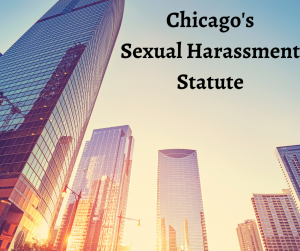The City of Chicago’s newly amended sexual harassment ordinance, which takes effect July 1, will bring an enhanced definition of the term, new written policy and notice requirements, new training requirements for employers, additional safety measures, a longer statute of limitations—and heftier penalties for those found guilty.
Every Chicago business must comply with these new laws. And the new laws should be words-to-the-wise to all Illinois Businesses in ensuring compliance with state law, which we’ve detailed in this earlier post.
The City’s definition of sexual harassment starts with the notion that people of all gender identities can be victims. Among the acts that fall within the definition are unwelcome sexual advances or sexual conduct, requests for sexual favors or conduct of a sexual nature, and sexual misconduct—an addition to the definition—that involves coercion, abuse of authority or misuse of the alleged accused’s employment position.
Within the employment context, the stipulation about requests for sexual favors applies to those either stated or implied to be a term or condition of the person’s employment, where rejecting the request could impact the person’s employment, or where the conduct “has the purpose or effect of substantially interfering with an individuals’ work performance, or creating an intimidating, hostile, or offensive working environment,” the law states.
As of July 1, all employers in the City will be required to post a written policy document on sexual harassment that includes, at a minimum, a statement that sexual harassment is illegal in Chicago, the definition outlined in the legislation, and the requirement that all employees participate in annual sexual harassment training—one hour at least, and two for those in managerial or supervisory positions, as well as one hour of bystander training for all. (Relevant training modules will be made available on July 1.)
The written notice—which must include both a handout within the first week of employment in the employee’s primary language, as well as a poster in a public area of the employment space—also must include examples of the types of prohibited conduct that fall under the definition, details on how to report allegations including how to do so confidentially, and a statement that retaliation for making such reports is illegal in the city.
The changes to the city’s sexual harassment law also include an expanded timeline, from 10 to 30 days for the Chicago Commission on Human Relations to notify the alleged offender, which is designed to mitigate against any potential retaliation; for example, a capricious denial of a reasonable accommodation request under the Illinois Victim’s Economic and Security Act.
The newly amended law also includes an increase in the statute of limitations for reporting sexual harassment and any other form of discrimination, from 300 to 365 days. And perhaps most heartening for victims, statutory penalties levied for any and all types of discrimination have been increased ten-fold: from $500 to $1,000 per violation, to $5,000 to $10,000.
If your business does not have a sexual harassment policy in place, we suggest that you contact us for assistance in developing a program and policy that will protect your business from problems that can be avoided.
 Chicago Business Attorney Blog
Chicago Business Attorney Blog


